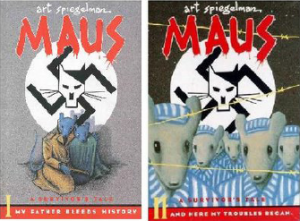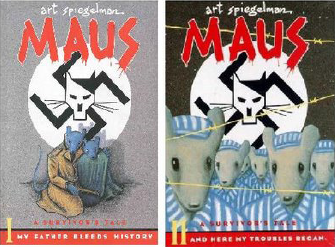
The Gerhold Lecture series has featured many famous scholars, writers, and dignitaries since its inception, but Art Spiegelman was the first to open his lecture with a profanity.
Spiegelman gave his lecture, titled What the %@&*! Happened to Comics?, on October 27.
“What the percent mark, amphora, ampersand, star, exclamation mark happened to comics. What a great fucking word, huh?” Spiegelman said to begin his talk.
Spiegelman was described in the opening remarks by Dr. Susan Nash as “helping to bring comic books to the forefront of literature,” and was also called “one of the most important writers of the past 25 years.”
Spiegelman won the Pulitzer Prize in 1992 for his Holocaust narrative Maus, which showed Nazis as cats and Jews as mice. Maus followed Spiegelman’s interviews with his father, who described the atrocities he experienced at Auschwitz.
Talking about why comics were the appropriate medium to convey this powerful story, “Comics are how our brains work. We think in bursts of language and icons,” Spiegelman said.
The Pulitzer Prize is not the only laurel Spiegelman has earned. In 2005 he was named one of Time Magazine’s “100 Most Influential People,” and in 2011 he won the Grand Prix at the Angoulême International Comics Festival. It was only the third time in history that an American has won that award.
Spiegelman’s lecture focused on comics being an art form and a medium that can greatly influence people’s lives. As proof, he talked about his own upbringing, and said he had gained life lessons and learned about the world from everything from Batman to MAD Magazine.
“If it reflects the way the brain works, it can be art,” Spiegelman said, “America has always had an inferiority complex, so we would look to Europe for our culture, like great paintings, but we don’t have to do that.”
Speigelman’s lecture was not just educational, but personal, as he discussed how he wrote Maus to deal with his strained relationship with his father, and now lives in the shadow of that great work. At the end of his lecture, he played an audio tape of his now deceased father recounting a woman wanting to take her own life at Auschwitz. The tape left the audience in a stunned and solemn silence before they erupted into applause.
Capital Senior Stefan Smetanko described the event as “super educational. It made me think of comics in a way I wouldn’t have before, and I’m a comic nerd! [Spiegelman’s message] was one of humanism; it’s an American ideal.”
Junior Courtney Winterberger also enjoyed the message.
“I found what he had to say extremely interesting. I didn’t even realize until I checked my watch that he had been talking for an hour and a half,” Winterberger said.
Despite all the praises that have been heaped upon him, Spiegelman remains humble. “I’ve been called the father of the graphic novel,” he said. “But I’m still waiting on the blood test.”

